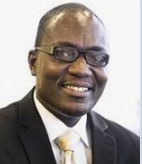…This trailblazing sanitation leader in northern Ghana is on iDE’s ‘40Under40’ lis
When you meet Adam Adamu, you’ll immediately sense that she was destined to be a leader – and it will come as no surprise to learn that she was selected in 2023 as the first candidate for the iDE ‘40Under40’ entrepreneur list.
A businesswoman at heart, Adam became the first Ghanaian woman to own and operate a toilet business in 2018 – selling her products and services through Sama Sama, the sanitation brand iDE has established in northern Ghana. By focusing on women’s preferences and needs as toilet business owners and creating opportunities for women in key sales and management positions, Sama Sama is challenging gender norms… transforming women’s economic and social status.
For Adam, selling and installing toilets means more than just income. She finds great satisfaction in providing an essential service in her community, building a sustainable business and being a role-model for her daughter. “Of course I wanted the additional income, but I also wanted to be part of this business. It’s masculine, and I wanted to prove to men that I can do as much as they can do,” she emphasised.
Being a woman in a male-dominated industry certainly isn’t easy, but Adam is inspiring other women to become toilet entrepreneurs as well, transforming sanitation in northern Ghana. “I did this to prove to women that we can take care of ourselves,” she insisted. “We don’t have to depend on men to provide. We can play a part. Women should learn to be independent; we should learn to go out and work. We can do anything we want – toilet business ownership or anything else.
“There was one male customer in town who was not happy that I would be installing the toilet,” Adam reported. “But after I finished, he was so pleased with the quality of my work that he ordered another toilet for a family member and insisted I install it, too.”
Adam doesn’t spend a lot of time worrying about how customers perceive her, though. She’s got bigger goals, like expanding her business and continuing to set an example for her daughter, Rida, after whom her company is named – Rida Enterprises. “I hope that by watching me, Rida will be empowered, satisfied and confident in herself,” Adam remarked. “I hope she will be hardworking.”
As part of her business, Adam manages 10 staff and oversees toilet construction and installations – and those installations are often challenging. For Adam, the most difficult part of the business is making the concrete rings for the pit, getting the mix just right and then transporting them. Rings are heavy and require three people to lift. Then, en route there’s always a chance they will break, depending on how far the team is going and what the roads are like along the way. But Adam is determined.
“My main challenge initially was in how I work with the men, because I’m a Muslim and we are not allowed to interact much with men. So, when I joined the business I decided to pick some of my family members who were unemployed to work with me,” she explained. “I have several workers because I have one who digs the pits, another one who moves the rings, and another one who transports my materials from my house to the customer’s place.”
The Sama Sama story
As of 2014, when iDE began addressing the sanitation issue in northern Ghana, less than 10 percent of households in rural Ghana had an improved, unshared toilet facility. Around 11 percent were using open pits, which do not separate human waste from the environment or human exposure. Approximately 45 percent were sharing facilities, while a little more than 34 percent had no facility at all.
As a result of poor access to sanitation facilities, some of the highest incidences of childhood diarrhea were occurring in northern Ghana; as well as high rates of moderately or severely stunted children. There was a clear need for sanitation solutions, and lots of possibilities.
Through their own human-centred design research process, iDE learned there was no affordable toilet nor handwashing product or service available for the middle of the sanitation market in northern Ghana. This insight led to a clear value proposition for the creation of a social enterprise called Sama Sama. The vision for Sama Sama was to create an aspirational commercial brand to deliver sanitation and hygiene solutions, and provide households with a simple one-stop-shop solution for buying a toilet.
The consequences of poor sanitation are clear: Globally, more children die from diarrheal disease than from HIV/AIDS, tuberculosis and malaria combined. Sustainable Development Goal 6.2, the ambitious goal set by the United Nations to address this, calls for universal access to safely managed sanitation services by 2030 – and Adam Adamu and women like her are working hard to see that goal achieved.
About iDE’s ‘40Under40’:
iDE’s ‘40Under40’ list shines a spotlight on 40 exceptional entrepreneurs who are influencing real social change in their rural communities around the world. The farmers, suppliers, salespeople, and leaders on this list are building markets for products that improve their customers’ well-being while helping them escape poverty. As role-models, they’re inspiring the next generation to take charge of their own lives. And they’re helping to solve local problems, such as exploring new ways of handling the effects of climate change. To learn more about iDE’s ‘40Under40’ list, visit ideglobal.org/40under40








